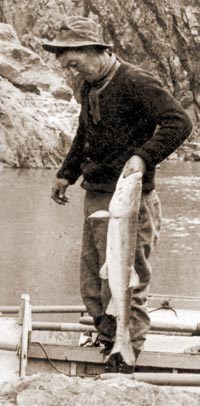|
Three of the eight species of native species of fish are no longer found in Grand Canyon National Park. 
Illustration by Joe Tomelleri 
Kolb Brothers Status: Endangered The Colorado pikeminnow is endemic to the Colorado River and is the largest member of the minnow family on the continent, with a maximum length of six feet (72 inches or 1800 mm). The Colorado pikeminnow is extirpated from Grand Canyon, with the last verified record in 1972. Pikeminnow are still found in the upper end of Lake Powell, in the San Juan River, and in the Yampa and Green Rivers in Dinosaur National Park. The Colorado pikeminnow was the top predator in the Colorado River, feeding on all species of fish. These torpedo-shaped fish have large mouths and are slow-stalking predators. 
llustration by Joe Tomelleri
Bonytail (Gila elegans) Status: Endangered

Illustration by Joe Tomelleri Roundtail chub (Gila robusta) Roundtail chub are one of three species of chub historically found in Grand Canyon. The species was likely extirpated from the canyon by the late 1960s. Although their populations have decreased because of human-caused changes to the Colorado River system, including introduction of non-native warm-water fish species, and the construction and operation of dams and water diversions, roundtail chub are the most abundant of the river's three species of chub outside of Grand Canyon. They are similar in size to humpback chub (20 inches or 500 mm), and are closely related. In fact, it is difficult for fisheries biologists to distinguish juvenile members of the two species. |Roundtail chub probably inhabited low-velocity reaches of the Colorado River in Grand Canyon. The species was first described from specimens collected near Grand Falls on the Little Colorado River in the 1850s. Roundtail chub have been absent from Grand Canyon since the 1960s. |
Last updated: February 24, 2015
